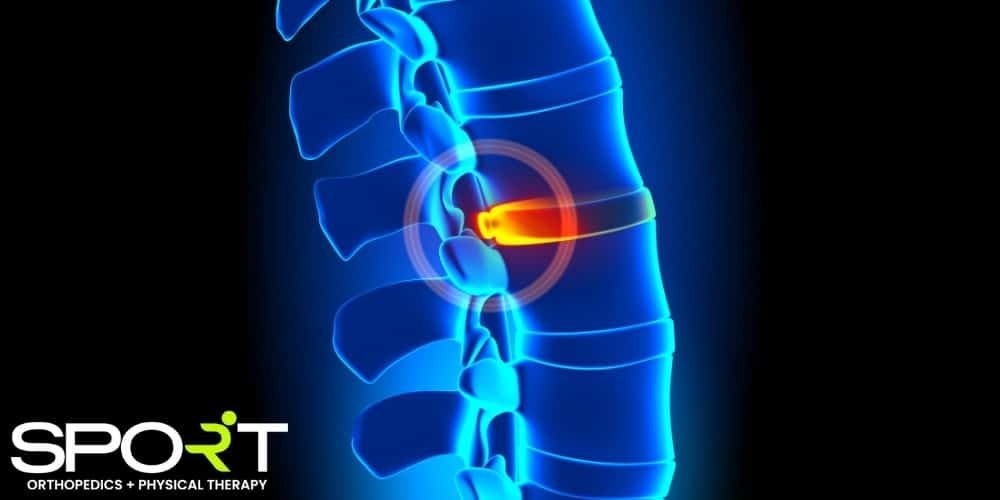
If your back pain has persisted for too long, even after trying multiple conservative treatments, it may be time to consider back or spine surgery. Although it may seem like a drastic decision, spine surgery is a viable and effective option for those whose lives are impacted by debilitating back pain. Now that you’ve decided to consider spinal surgery, what kind of doctor should you approach for treatment? In this blog, we explore the similarities and differences between having a neurosurgeon vs orthopedic surgeon handle your spine surgery.
At SPORT Orthopedics + Physical Therapy, our orthopedic spine surgeons are confident in our ability to provide stellar results and a smooth recovery period for our patients. Back pain is no joke, and it can completely change the way you live your life. Don’t let sports injuries and back pain stop you from doing the things you love. Call SPORT today at 469-200-2832 to schedule an appointment with us.

First, it’s important to understand exactly what orthopedic surgeons and neurosurgeons are. Neurosurgeons specialize in the diagnosis and treatment of conditions that affect the nervous system. This includes the central nervous system, the peripheral nervous system, the brain, the spinal cord, the spinal canal, and the nerves in the body. Although these doctors do perform surgeries, they can also administer nonsurgical treatments.
It takes years of training and studying to become a spine surgeon. Neurosurgeons specifically must complete medical school and a neurosurgery residency before they can perform spine surgery. Below, we list the specific requirements for becoming a neurosurgeon.
Some neurosurgeons undergo fellowship training after their residency in order to specialize in a certain area of neurological surgery. For example, they may undergo a spine fellowship in order to specialize in spine surgeries.
Neurosurgeons diagnose and treat conditions that affect the body’s nervous system. They often perform complex surgical procedures, such as brain surgery and spinal surgery. However, most spine specialists will recommend and administer more conservative treatments before proceeding with spine surgery. When the pain or condition does not respond to conservative treatments, this is when they begin to consider spine surgery.
Neurosurgeons are well known for effectively treating conditions such as the following.
One of the main differences between the two types of surgery is that neurosurgeons do not operate on parts of the body that don’t belong to the central and peripheral nervous systems. Orthopedic surgeons administer surgical treatment to all joints and bones in the body. This often includes various spinal surgeries, although not every orthopedic surgeon will perform spine surgery.

Orthopedic surgeons specialize in treating pediatric and adult patients when they have problems with their bones, joints, ligaments, tendons, and muscles. In other words, they diagnose and treat conditions of the musculoskeletal system. Both orthopedic surgeons and neurosurgeons administer surgical and nonsurgical treatments. Also, like neurosurgeons, orthopedic surgeons can specialize in a certain area of orthopedics. For example, someone could be an orthopedic spine surgeon who specializes in spine surgery.
Orthopedic surgeons and neurosurgeons both have extensive education and training requirements. In order to become an orthopedic surgeon, one must meet the following requirements.
Many orthopedic surgeons participate in orthopedic training programs to specialize in a particular area of their field. For example, some complete a spine fellowship program to specialize in orthopedic spine surgery. Fellowship-trained surgeons have extensive surgical experience in their area of specialty.
Orthopedic surgeons diagnose and treat complex musculoskeletal system conditions and disorders. They can also help with rehabilitation. Many sports medicine specialists are also orthopedic doctors. They are specifically trained to be able to develop long-term treatment plans for countless musculoskeletal disorders. Not only can they perform surgical procedures, but they can also administer nonsurgical treatments.
Orthopedic surgeons are well-known for treating conditions such as the following.

Generally, both neurosurgeons and orthopedic surgeons who are fellowship-trained in spine surgery can operate and treat many of the same conditions. However, there are a few cases in which one field may be a better option than the other. For example, let's say that a patient has scoliosis. Oftentimes, orthopedists have more experience treating bone deformities, so it may be better to go with them than a neurosurgeon. But what about spinal tumors inside the spinal cord? A neurosurgeon with fellowship training may be a better choice to treat spinal tumors.
Therefore, if your condition is located within the spinal column, you may be better off with a neurosurgeon. They are trained in intradural surgery during their residency, which means they already have the necessary training to operate inside the spine.
Both neurosurgeons and orthopedic surgeons may perform spine surgery. However, only neurosurgeons can perform brain surgery. They can both operate on the joints of the spine and treat age-related spine conditions. The best way to determine which doctor is right for you is to schedule an appointment with spine surgeons from each field.

This highly depends on the nature of your condition, as well as the residency training of the surgeons. Many spinal procedures can be performed equally as well by both. However, a spine surgeon in one field may have more relevant experience than the other. As a patient, there are several questions you can ask to gain a better understanding of a spine surgeon’s skill.
These questions should give you a good idea of which surgeons are more qualified to treat you.
This depends on the severity of your back pain. If the pain has just begun, we recommend trying pain relievers for the first two days. After those two days, try alternating between heat and ice. Get plenty of rest, but refrain from complete bed rest. If the pain persists for two weeks or more, it’s time to schedule a doctor’s visit. This is especially important if it keeps you from participating in your normal activities. For very severe back pain, see a doctor within two weeks.
If you have any of the following symptoms, we recommend seeking immediate medical attention.

At SPORT Orthopedics + Physical Therapy, we have extensive experience helping patients in the DFW area find relief from debilitating back pain. Some of the back conditions we treat include the following.
Using only the latest in surgical and nonsurgical medical technology, we’re here to identify the source of your pain and develop a personalized treatment plan for you.

At SPORT Orthopedics + Physical Therapy, our number one goal is to get you back on your feet and back in the game. Not only do we help athletes and hobbyists with their joint problems, fractures, and other painful conditions, but we also help patients with their spine health. Our orthopedic specialists and Dallas physical therapists work in tandem to provide only the best in modern orthopedic care. To schedule an appointment with a Dallas orthopedic doctor, please call our office at 469-200-2832 today.








*We accept most all insurance plans, if you do not see your plan listed above or have any questions, please contact our office.

SPORT Orthopedics + Physical
Therapy – Dallas, TX
Services:
• Clinic • Orthopedic • Urgent Care
• Physical Therapy
18152 Preston Road
Suite I-2
Dallas, TX 75252
Phone: (469) 200-2832
Fax: (469) 269-1074
SPORT Orthopedics + Physical Therapy
– Frisco, TX
Services:
• Clinic • Orthopedic • Urgent Care
• Physical Therapy
9255 Dallas Parkway
Suite I20
Frisco, TX 75033
Phone: (469) 200-2832
Fax: (469) 269-1074
SPORT Orthopedics + Physical
Therapy – Wylie, TX
Services:
• Clinic • Orthopedic • Urgent Care
• Physical Therapy
3400 FM 544
Suite 650
Wylie, TX 75098
Phone: (469) 200-2832
Fax: (469) 269-1074
SPORT Physical
Therapy – Prosper, TX
Services:
• Physical Therapy
790 N Preston Rd
Suite 60
Prosper, TX 75078
Phone: (469) 200-2832
Fax: (469) 269-1074
SPORT Orthopedics – Mesquite, TX
Services:
• Clinic
• Orthopedic
• Urgent Care
1102 North Galloway Ave
Mesquite, TX 75149
Phone: (469) 200-2832
Fax: (469) 269-1074
Due to the high volume of calls, we want to inform all patients and providers that our phones are only active during our open hours of 8:30 AM – 5:00 PM. The lines will not ring outside of these business hours or during our lunch break from 12:00 PM to 1:30 PM. For faster assistance, please text us at 469-200-2832. If you need to schedule an appointment, the most efficient method is to book online on this website.